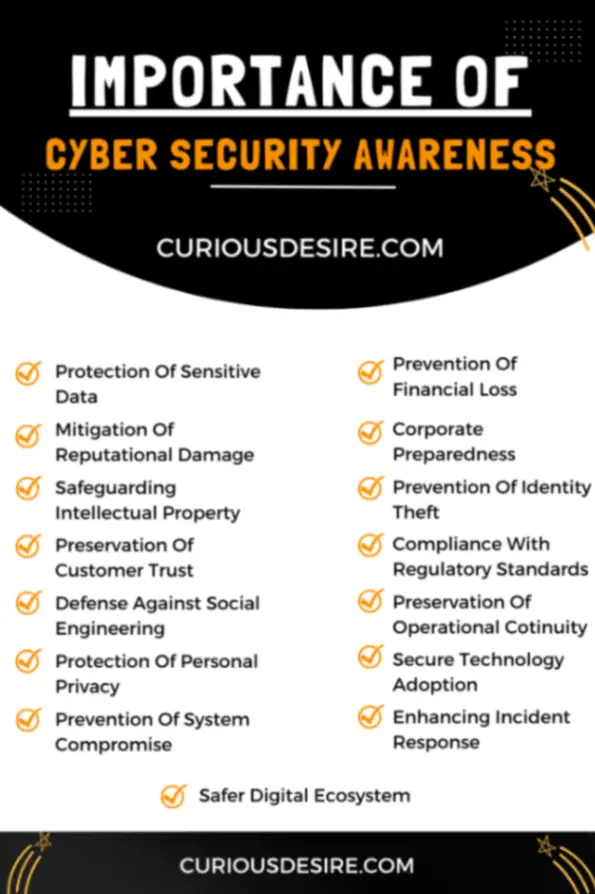In today’s digital age, the significance of cybersecurity awareness cannot be overstated.
The prevalence of digital technologies in every aspect of our lives has led to a surge in cyber threats, making cybersecurity awareness not just beneficial but essential.
In today’s hyper-connected world, where cyber-attacks can have devastating consequences, understanding the importance of cybersecurity awareness is no longer just an option; it’s a necessity
From exploring the latest cyber threats to discussing practical tips for staying secure, this blog will equip you with the knowledge you need to navigate the digital landscape with confidence.
5 Most Common reasons for the importance of cyber security awareness:
- Protection of Sensitive Data
- Prevention of Identity Theft
- Contribution to a Safer Digital Ecosystem
- Preservation of Customer Trust
- Prevention of System Compromise

1. Protection of Sensitive Data
Cybersecurity awareness is crucial for safeguarding sensitive personal and organizational data from unauthorized access and potential theft.
- Personal Data Protection: Cybersecurity awareness helps you protect your personal information from being stolen and misused. This includes financial information, social security numbers, and other personal data that could lead to identity theft.
- Organizational Data Security: For organizations, a data breach can result in the loss of sensitive information such as customer data, intellectual property, and trade secrets. Awareness and training can significantly reduce the risk of such breaches.
2. Prevention of Financial Loss
Cyberattacks can have devastating financial impacts. From the direct loss of money in phishing scams to the indirect costs associated with a data breach, including legal fees, fines, and reputational damage.
By recognizing the potential impact of financial fraud, ransomware, and phishing scams, you are better equipped to identify and report suspicious activity, thus reducing the risk of financial exploitation.
3. Mitigation of Reputational Damage
For businesses, a single cyberattack can severely damage the trust that customers have in the brand, leading to lost business and a tarnished reputation. Awareness and proactive measures can mitigate these risks
By recognizing the consequences of data breaches and cyberattacks on public trust and brand integrity, organizations can work to avoid reputational damage that may result from compromised cybersecurity.
4. Personal and Corporate Preparedness
Understanding the landscape of cyber threats and the potential consequences of a security breach fosters a sense of preparedness among people and organizations.
By being well-informed about the evolving nature of cyber threats, you can proactively implement security measures and respond effectively to potential risks.
5. Safeguarding Intellectual Property
Cybersecurity awareness is essential for protecting valuable intellectual property from theft or unauthorized access.
By recognizing the importance of safeguarding trade secrets, proprietary information, and innovations, you can reinforce their defenses against intellectual property theft and industrial espionage.

6. Prevention of Identity Theft
If you are well-versed in cybersecurity awareness, you are better equipped to prevent identity theft.
You can protect your identities and personal assets from cybercriminals by recognizing their methods for stealing personal information and perpetrating identity fraud.
7. Preservation of Customer Trust
For organizations, cybersecurity awareness plays a pivotal role in preserving customer trust.
Understanding the impact of data breaches on customer privacy and security measures enables businesses to prioritize cybersecurity and uphold trust with their customer base.
8. Compliance with Regulatory Standards
Cybersecurity awareness ensures adherence to regulatory standards and data protection laws.
Through awareness of the legal implications of data breaches and the importance of privacy regulations, you can align your practices with legal requirements and mitigate the potential repercussions of non-compliance.
9. Defense Against Social Engineering Attacks
Comprehensive cybersecurity awareness empowers you to recognize and defend against social engineering attacks such as phishing and pretexting.
By understanding the tactics used by cybercriminals to manipulate human behavior and exploit trust, you can identify and thwart social engineering attempts effectively.
10. Preservation of Operational Continuity
Organizations that prioritize cybersecurity awareness strengthen their operational continuity.
By understanding the disruptive potential of cyberattacks on critical systems and infrastructure, they can implement measures to protect against potential downtime and maintain business operations in the face of cyber threats.
11. Protection of Personal Privacy
You can safeguard your privacy through cybersecurity awareness.
You must understand the severe implications of unauthorized surveillance, data collection, and privacy violations.
By doing so, you can take assertive steps to safeguard your privacy rights and significantly reduce the risk of exploitation by malicious entities.
12. Promotion of Secure Technology Adoption
Cybersecurity awareness facilitates the responsible and secure adoption of emerging technologies.
By recognizing the security implications of new technologies such as IoT devices, cloud platforms, and mobile applications, you can make informed decisions regarding their implementation and use.
13. Prevention of System Compromise
Awareness of cybersecurity best practices enables you and organizations to prevent system compromise and unauthorized access to networks and devices.
By comprehending the methods used by cybercriminals to exploit system vulnerabilities, you can proactively implement security measures to thwart potential attacks.
14. Enhancing Incident Response Capabilities
Comprehensive cybersecurity awareness contributes to the enhancement of incident response capabilities.
By adopting a collaborative and proactive approach to addressing security incidents, you can protect yourselves against potential losses and minimize the overall impact of such incidents
15. Contribution to a Safer Digital Ecosystem
Collectively, cybersecurity awareness efforts contribute to the establishment of a safer and more secure digital ecosystem.
It is important to promote a culture that prioritizes cybersecurity awareness and education, both at the individual and organizational levels.
This can significantly contribute to enhancing the overall resilience and integrity of the digital ecosystem, which in turn benefits society as a whole.
Companies Affected by Cyber Attacks
The rise in cyberattacks and data breaches in the past few years is alarming, with numerous well-known companies falling victim to these incidents.
1. Yahoo
Yahoo experienced one of the largest breaches ever when it announced in 2016 that data associated with at least 1 billion accounts was stolen in 2013. Later, it updated the estimate to include all 3 billion of its users.
The stolen information included names, email addresses, telephone numbers, dates of birth, and hashed passwords.
2. Equifax
One of the most significant data breaches in history, the Equifax cyber attack, exposed the personal information of approximately 147 million people.
It impacted around 145.5 million American citizens, as well as 400,000–44 million individuals from the United Kingdom and 19,000 Canadians.
Hackers exploited a vulnerability in a web application to access sensitive data, including social security numbers, birth dates, addresses, and, in some instances, driver’s license numbers.
3. Sony Pictures Entertainment
Sony Pictures suffered a devastating cyber attack attributed to North Korean hackers, purportedly in retaliation for the planned release of “The Interview,” a comedy about a plot to assassinate North Korea’s leader
The attackers leaked confidential data, including personal information about employees, emails between employees, copies of unreleased Sony films, and other sensitive information.
10 Tips to Help Spread Cybersecurity Awareness
Spreading cybersecurity awareness is an essential step in ensuring the safety and security of personal and professional data. Here are 10 tips to help spread cybersecurity awareness:
1. Educate About Phishing Attacks
Phishing attacks are attempts to steal sensitive information by disguising themselves as trustworthy entities in electronic communication.
- Educate people about the warning signs of phishing emails, such as misspelled URLs, generic greetings, and urgent requests for personal information.
- Emphasize the importance of not clicking on suspicious links or downloading attachments from unknown sources.
- Encourage the use of email filtering and protective software to prevent phishing attacks.
2. Password Practices
Educate them about the significance of creating strong, unique passwords for each of their accounts.
Strong passwords should be long and contain a mix of letters, numbers, and special characters. Encourage the use of password managers to securely store and generate complex passwords.
3. Social Engineering Awareness
Raise awareness about the dangers of social engineering, a technique used by cybercriminals to manipulate people into divulging confidential information.
Train people to be cautious when sharing personal or sensitive information with strangers, whether it’s over the phone, email, or in person

4. Mobile Device Security
With the increasing use of mobile devices, it’s crucial to educate people about mobile security practices.
Emphasize the importance of keeping mobile operating systems and apps updated to patch security vulnerabilities.
5. Secure Wi-Fi Usage
Highlight the risks associated with using unsecured public Wi-Fi networks.
Advise people to avoid accessing sensitive information, such as banking or personal accounts, while connected to public Wi-Fi.
Encourage the use of virtual private networks (VPNs) to encrypt internet traffic and enhance online privacy and security.
6. Regular Software Updates
Stress the significance of keeping software, operating systems, and applications up-to-date.
Outdated software can contain vulnerabilities that cybercriminals can exploit.
7. Data Backup Importance
Regular data backups are important to protect against data loss due to cyber threats, hardware failure, or accidental deletion.
Emphasize the 3-2-1 rule, which recommends having three copies of important data stored on two different media, with one copy stored offsite.
8. Safe Social Media Practices
Highlight the importance of being cautious about the information shared on social media platforms.
Be wary of accepting friend requests from unknown individuals, and avoid posting sensitive personal or financial information online.
9. Encourage Reporting Suspicious Activity
Establish clear procedures for reporting phishing emails, suspicious links, or unauthorized access attempts.
Encourage open communication and understand the importance of reporting potential security threats promptly.
10. Continuous Training and Awareness Programs
Promote ongoing cybersecurity training and awareness programs within organizations and communities.
Reinforce the idea that cybersecurity is a shared responsibility and that everyone plays a critical role in maintaining a secure digital environment.
Source: Clover Infotech YT Channel
Conclusion
As technology continues to advance, the risks and threats to personal and organizational data also evolve, making it essential for you to prioritize cybersecurity education and best practices.
Through education about strong password practices, secure Wi-Fi usage, mobile device security, and data backup protocols, we can build a more resilient defense against cyber threats.
Emphasizing safe social media practices, the significance of reporting suspicious activity, and the need for regular software updates help create a culture of vigilance and proactive cybersecurity measures.
By instilling this knowledge and mindset, we can collectively contribute to a more secure digital environment for everyone
Importance of Cybersecurity Awareness FAQs
1. Why is cybersecurity awareness important?
Cybersecurity awareness is crucial because it helps individuals and organizations recognize and respond to cyber threats effectively. It empowers them to protect their data, systems, and networks from malicious activities, reducing the risk of cyber-attacks and their associated consequences.
2. What are the common cyber threats that cybersecurity awareness helps to combat?
Cyber threats include phishing attacks, ransomware, malware, social engineering, insider threats, and more. Cybersecurity awareness equips individuals to recognize these threats and take the necessary precautions to avoid falling victim to them.
3. How can cybersecurity awareness help in preventing social engineering attacks?
Social engineering attacks rely on manipulating individuals into divulging confidential information or performing certain actions. Cybersecurity awareness educates individuals about common social engineering tactics, enabling them to recognize and resist such manipulative attempts.
4. What impact does cybersecurity awareness have on the development and use of secure software and applications?
By promoting a security-conscious mindset, cybersecurity awareness encourages software developers and users to prioritize security in the design, development, and use of software and applications, reducing the likelihood of vulnerabilities and exploitation.
5. How does cybersecurity awareness contribute to the protection of healthcare data and patient privacy?
In the healthcare industry, cybersecurity awareness is essential for ensuring the security and privacy of patient data, guarding against ransomware attacks, and maintaining the integrity of critical medical systems and devices